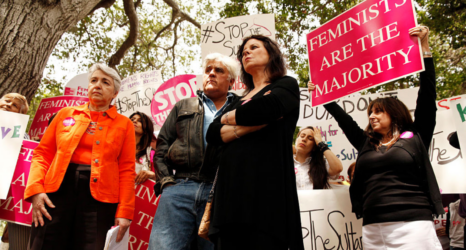The United States has the worst parental leave policies in the developed world. It’s one of those depressing facts that’s gone unchanged for so long that it hardly registers anymore—despite the demonstrated negative impact on women’s health, infant health and women’s financial equality.
Maternal health in the U.S. is also in a state of crisis, one that goes way beyond the lack of paid parental leave for those who need it. American women don’t just lack support at work for their family lives; they lack support across society in almost every critical aspect of reproduction, from prenatal to child care.
A full 24 percent of women in the U.S. do not receive the recommended number of prenatal care visits—and for Latinas, that number rises to 50 percent. Rural hospitals and clinics around the country are closing due to cuts in funding, meaning that in many counties women must drive hundreds of miles to access obstetric care. More than half of rural counties in the U.S. lack hospital obstetric services, with the predictable result that more women and babies are dying.
The maternal mortality rate in America remains higher than in any other developed nation, and our maternal mortality rate is the only one in the developed world that’s continuing to rise. Between 700 and 800 women in the United States die every year of preventable complications of pregnancy and childbirth, and another 65,000 nearly die. That’s higher than almost anywhere else in the world. Women of color are three times more likely to die of such complications, primarily due to unequal access to health care.
I wish I could say that this shocking, unacceptable picture improves once a pregnant woman safely delivers—but the fact is, it gets worse. One in three American families can’t afford diapers, and one in five American children live with food insecurity. Over half of American families live in a childcare “desert,” resulting in three-quarters of mothers and half of fathers having lost income or work because of a lack of affordable child care. More than 60 percent of young children in the U.S. don’t have access to public preschool.
Is it any surprise that the birth rate in the U.S. is the lowest it’s been in over three decades? It’s like we’re trying to make it punishingly hard to be a person with a uterus in America—which brings us, of course, to reproductive health.

Over one dozen states have recently passed or proposed legislation that aims to criminalize or severely restrict women’s access to abortion, largely based on the scientifically unfounded notion that a “heartbeat” exists after six weeks of pregnancy.
Anti-abortion laws and the maternal health care crisis are rarely discussed in tandem, but the issue at play in both is one and the same. If pregnancy is a medical condition, which it most certainly is—one that we as a country are noticeably failing to treat with any kind of competence—the termination of a pregnancy is also a medical procedure for which women have the right to demand safe, legal and affordable access.
Motherhood matters—but for women across the country today, it’s a struggle. In fact, it’s often actually dangerous. Joy and love and daily doses of gobsmacking cuteness aside, being a parent is already financially, physically and emotionally difficult. Lawmakers don’t need to make it harder, and they shouldn’t be trying to.
The catchphrase “abortion is health care” rubs some people the wrong way, but it boils down into four words an essential truth, espoused by literally every major accredited medical organization for women’s health. A woman’s health care, including her reproductive health care, needs to be governed not by legislation, but by women and their doctors. (If she can find one. And afford one. And get time off work to visit one.)
Restricting access to abortion is simply part of a system of catastrophic failures to provide basic, essential, life-saving women’s health care services. The proof is staring us right in the face.
Fourteen out of the 15 states that are currently seeking to restrict or criminalize abortion rank in the bottom third in a list of the worst states to be a working mother—based on access to childcare and healthcare, cost of living and employment opportunity.
The very same states seeking to criminalize and restrict abortion also have the worst infant mortality rates in the country. Alabama, Mississippi, Arkansas, Georgia, Ohio, Louisiana, South Carolina and Kentucky all rank in the bottom third. Alabama, the state whose anti-abortion laws dropped the most jaws nationwide this month, has an almost staggeringly poor record with regard to keeping women and children alive and healthy, and the second-highest infant mortality rate in the country. Only half of Alabama counties even have an obstetrician.
This is not a coincidence. The push to restrict abortion access isn’t happening because these states’ governing bodies care about women’s bodies, children’s bodies or lives. It’s happening because making women’s health services difficult or impossible to get maintains a state of inequality that radically benefits some while desperately disadvantaging others—specifically women, and especially women of color.
No law has ever passed in any state to legislate male reproductive function, even though abortion is the most regulated form of care in the nation. Men are, of course, responsible for unwanted and unsafe pregnancies every day. In fact, you could argue that men cause 100 percent of abortions—even though they are not held responsible legally, financially and in terms of healthcare for none.
Lawmakers who claim to care about “preserving life” should care about access to prenatal health care, obstetric care, high quality and affordable child care and maternity leave—and they should care about access to safe and legal abortion.
The fight for equal access to quality women’s health care, with reproductive health care options that include abortion, is a fight none of us should allow to be misdirected—or lost.





